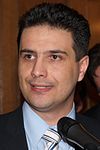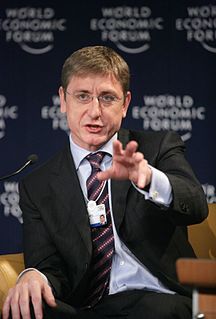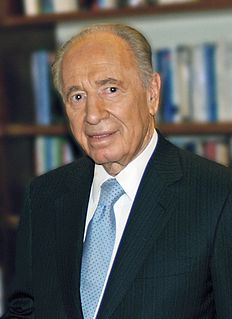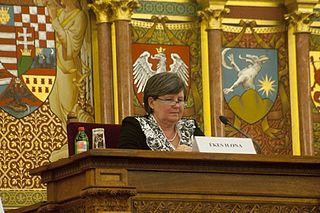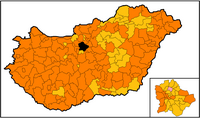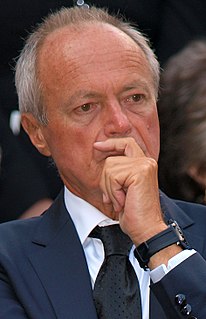
Péter Medgyessy is a Hungarian politician and was the Prime Minister of the Republic of Hungary from 27 May 2002 until 29 September 2004. On 25 August 2004 he resigned over disputes with coalition partner Alliance of Free Democrats, but remained caretaker Prime Minister for a 30-day period as required by the Constitution, and a few additional days until his successor Ferenc Gyurcsány was confirmed by Parliament.

The National Assembly is the parliament of Hungary. The unicameral body consists of 199 members elected to 4-year terms. Election of members is based on a complex system involving both area and list election; parties must win at least 5% of the popular vote in order to enter the list of members of the assembly. The Assembly includes 25 standing committees to debate and report on introduced bills and to supervise the activities of the ministers. The Constitutional Court of Hungary has the right to challenge legislation on the grounds of constitutionality. The assembly has met in the Hungarian Parliament Building in Budapest since 1902.
The Alliance of Free Democrats – Hungarian Liberal Party was a liberal political party in Hungary.

The Democratic Coalition is a social-liberal political party in Hungary led by former Prime Minister Ferenc Gyurcsány. Founded in 2010 as a faction within the Socialist Party (MSZP), the Democratic Coalition split from the MSZP on 22 October 2011 and became a separate party. It has nine MPs in the National Assembly and two MEPs in the European Parliament.

Krisztina Morvai is a Hungarian lawyer and nationalist politician. She is a Member of the European Parliament (MEP), having been elected on the list of the political party Jobbik – Movement for a Better Hungary in the 2009 European Parliament elections. Morvai is not a member of Jobbik, and currently supports Fidesz.

Politics Can Be Different is a green political party in Hungary. Founded in 2009, it was one of four parties to win seats in the National Assembly in the 2010 parliamentary election. The party is a member of the European Green Party.

An indirect presidential election was held in Hungary on 29 June 2010. The Prime Minister's nominee Pál Schmitt was elected by an absolute majority.

Sándor Fazekas is a Hungarian jurist and politician. He served as Minister of Rural Development, then Minister of Agriculture from 2010 to 2018, in the second and third cabinets of Prime Minister Viktor Orbán. He served as mayor of his hometown, Karcag between 1990 and 2010.
Hungarian local elections, 2006 took place on 1 October 2006 amidst a period of protests and demonstrations against the government of Prime Minister Ferenc Gyurcsány. In many cities, demonstrators urged people not to vote for the MSZP candidate at the elections, and Fidesz made heavy use of the fact that Gyurcsány had admitted lying in its campaign leaflets and phone calls.

An early indirect presidential election was held in Hungary on 2 May 2012, following the resignation of Pál Schmitt as President of Hungary on 2 April 2012. János Áder was elected President with an absolute majority.

The Opposition in Hungary is the body of political parties represented in the parliament which are not a part of the government supported by the parliamentary majority.
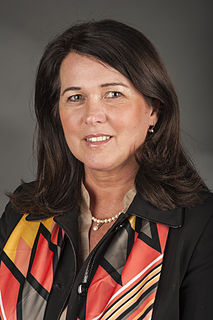
The European Parliament election, 2014 for the election of the delegation from Hungary to the European Parliament was held on 25 May 2014.

Hungarian Liberal Party is a liberal political party in Hungary that was formed on 27 April 2013 and is led by Gábor Fodor, a former MP and president of the Alliance of Free Democrats (SZDSZ).

The 2014 Hungarian parliamentary election took place on 6 April 2014. This parliamentary election was the 7th since the 1990 first multi-party election. The result was a victory for the Fidesz–KDNP alliance, preserving its two-thirds majority, with Viktor Orbán remaining Prime Minister. It was the first election under the new Constitution of Hungary which came into force on 1 January 2012. The new electoral law also entered into force that day. For the first time since Hungary's transition to democracy, the election had a single round. The voters elected 199 MPs instead of the previous 386 lawmakers.

József Tóbiás is a Hungarian politician, who served as the leader of the Hungarian Socialist Party (MSZP) from 19 July 2014 to 25 June 2016. He has been also a Member of Parliament since 1998.

A referendum related to the European Union's migrant relocation plans was held in Hungary on 2 October 2016. The referendum was initiated by the government, under the provision of article 8 of the new constitution of 2012. It was commonly referred to as the kvótanépszavazás or kvótareferendum in the Hungarian media.
Fidesz–KDNP Party Alliance, formerly also known as the Alliance of Hungarian Solidarity is a right-wing national conservative political alliance of two political parties in Hungary, the Fidesz – Hungarian Civic Alliance (Fidesz) and the Christian Democratic People's Party (KDNP). The two parties jointly contested every national elections since the 2006 parliamentary election. The Fidesz–KDNP party alliance has governed Hungary since 2010, altogether obtaining a two-thirds majority in each 2010, 2014 and 2018 national elections.





